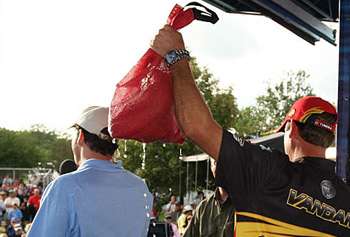
Part 1: Practice | Part 3: Multiday Tournaments
Fishing a one day tournament is what recreational competitive bass fishing is all about. It's the bread and butter of our sport. Here are a few tips from Kevin VanDam to help you do it right.
Part 2: One Day Tournaments
1. Be prepared — mentally, physically and mechanically.
"Everything I said in Part 1 of this series is applicable. You need rest, nutrition and equipment that works properly. Lack any one of those things and you're in for a rough go of it."
2. Know what you need to win.
"The most basic thing to keep in mind about a one day event is that there's no tomorrow. Your strategy should be to catch every bass you can during the hours allotted to you that's big enough to help you win. Ignore the rest. There's no time to waste on keepers that are too small to make the winning weight.
"To make an intelligent decision about what size fish to target, you need to have some idea of what it'll take to win. Do your homework. Know what it's going to take, and don't lose sight of that number. Why fish a spot with 2-pounders on it if it's going to take 20 pounds to win?"
3. Know when to hold 'em and when to fold 'em.
"That brings us to the issue of when to leave fish to look for bigger fish. It's the most common problem anglers face and one with no clear, well-defined answer.
"Basically, the decision on whether or not to move depends upon what kind of spot you're fishing. Is it a holding area or a feeding area? If it's a holding area, the fish will all be pretty much the same size. There's no reason to stay after you have a limit. It's ridiculous to swap 2-pounders.
"But, if it's a feeding area you may want to stay there awhile. As the fish move in to feed, and out to rest, their size is likely to change. Catching 2-pounders for an hour and then getting a 4-pounder makes sense. You're upgrading your bag.
"How you tell the difference isn't easy. There's no scientific test or mathematical formula that helps. It's a matter of experience and knowing your waters. Watch what the fish are doing, how they are moving and try to determine their mood. How aggressive are they? How did they react yesterday or last week? Do you always catch 2-pounders there or is there an occasional kicker weighed in from that spot?"
4. Watch the weather.
"Don't pick your places to fish based solely on what the weather was like yesterday. Think about what it's like today and what it'll be like tomorrow. That's much more important."
5. Don't limit your places to fish.
"Make sure you have several spots. There's no telling when you'll need them. Weather can keep you off a spot, so can other competitors or recreational boaters. And bass are funny creatures. We don't know much about them. They might just turn off for reasons known only to them, reasons we don't — maybe can't — understand."
6. Think outside the box.
"Don't fall into the trap of looking for five quick keepers and then working to upgrade. That's probably the number one strategy recreational tournament anglers employ. That works sometimes, and sometimes not. I'd like to suggest another strategy. It's worked for me. Maybe it'll work for you.
"Think about going to your big bass spot first thing in the morning and getting your day off to a good start. There's nothing that'll change your mental outlook like a 3- and a 4-pounder in the boat before 9 a.m. Think about weight, not numbers."
7. Keep your attitude positive.
"Always fish all day. Don't get discouraged and slow down or quit by 2 p.m. That's silly. I've caught good keepers on my last few casts more than once. Dwelling on 'bad luck' or a 'slump' is a lot of bunk. Think about your next cast, not your last one."
Part 1: Practice | Part 3: Multiday Tournaments




